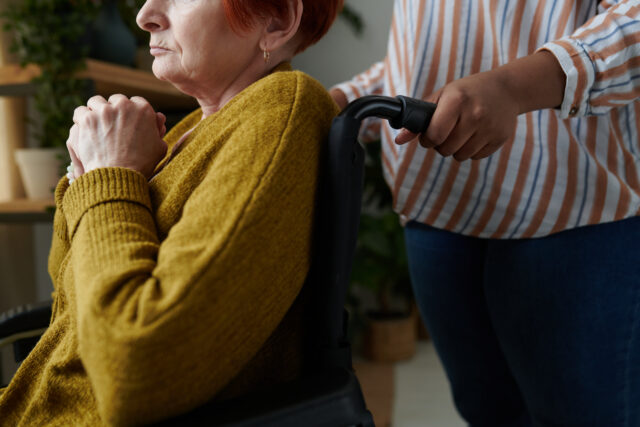
The Future of Retirement Is Now
Gray, small, and distinctly female.
This is what the director of MIT’s AgeLab, Joseph Coughlin, sees when he peers into the future of retirement.
“The context and definition of retirement is changing,” Coughlin said earlier this month at the Retirement Research Consortium meeting, where nearly two dozen researchers also presented their Consortium-funded work on a range of retirement topics. Their research summaries can be found at this link to the Center for Retirement Research, which supports this blog and is a consortium member.
Coughlin spooled out a list of stunning facts to impress on his audience the dramatic impact of rising longevity and graying populations in the developed world, and he urged them to think in fresh ways about retirement. In Japan, for example, adult diapers are outselling baby diapers. China already faces a looming worker shortage, and Germany’s population is in sharp decline. In 2047, there will be more Americans over age 60 than children under 15.
“The country will have the demographics of Florida,” Coughlin said.
The attitudes and comportment of the ballooning population of U.S. retirees – baby boomers – will be more confident and less polite than their parents’ generation, he predicted.
The U.S. labor force is also graying with the aging population. The average age of physicians in this country is already 53, and it’s 49 for nurses, 51 for truck drivers, 56 for financial advisers, and 50 for engineers. In five years, more than one-quarter of the U.S. labor force will be over 55, according to the Stanford Center on Longevity. And an AARP study finds that 40 percent of boomers say they plan to work “until they drop.” But to assume you can keep working, because “you have a master’s or PhD is a joke,” Coughlin warned. “If you don’t stay aggressive about your learning, you’ll fall behind.”
When he says the future is “small,” he means family size is shrinking, with implications for retirees and the elderly. More Americans today than in the 1970s live in a household of one, especially women. In the 1970s, nine out of 10 women had children, but today just eight out of 10 do, he said. This points to a future in which there will be fewer children to care for aging parents. And fewer caregiving spouses: divorce among people over age 50 has also increased dramatically in recent decades.
As the population ages, he sees women, who tend to live longer, becoming more influential, because they already make decisions about retirement and child care. Women, particularly oldest daughters, also do the heavy lifting for parental care.
Older people today are “old but not sick,” but they have multiple chronic conditions, often managed with multiple medications. Aging in the home will be a prime location for the kind of technological innovations Coughlin’s AgeLab specializes in.
He predicted that seniors increasingly will rely on gadgets like implantable sensors to monitor their blood pressure or smart mirrors that detect worrisome changes in their health or gait. He even talked about a $100,000 pop-up house, so mothers-in-law can live (alone?) in their children’s back yard.
The future is here, and Coughlin suggests that everyone “really rethink the contract around what retirement is.”
Comments are closed.







You academics ought to explore real life by experiencing what life is like at ages 60, 70, 80, and 90 in real situations in retirement communities. You might actually learn something useful and practical.
Jon Foyt (age 83), Rossmoor, Walnut Creek, CA
Your boomer retirement stats are compelling, but are they valid? Most likely not.
Self-reporting is a tenuous methodology because what respondents say they will do is not what they actually do. Might want to curb your enthusiasm about the data.
Read your comment (Jon Foyt, age 83), and believe you’ve made a meaningful contribution to the discussion on the reality of data and life itself.
All the best,
Dr. David Demko
Clinical Gerontologist
University of Michigan doctoral grad
I have many friends who are aging without children, or estranged from their children, or worse yet, supporting their adult children. (Women in particular will face the crisis of inadequate support systems for later life care). The maintenance of health and minimization of chronic disease due to poor diet, exercise, smoking/alcohol/drugs is now critical to the long-term quality of life. Gov’t and pension supported health care options will continue to contract to a minimum (due to declining contributions from younger workers) and those dependent on it will suffer rapid, permanent declines in quality of life and choices.
This is not true for public education or state and municipal workers. I know many who retired at age 58 or younger with a nice pension ($60k or more) plus health care. They have acquired no training since the early 1980s.
The real world now:
1) Many 60+ adults heavily in debt and reliant on credit cards, pensions and/or Social Security (both of which will contract relative to the COLA as deflation continues and tax revenues shrink.
2) Many 50+ adults seem to refuse to downsize their lifestyles until forced to do so by lack of funds or health issues.
3) Many 50+ adults still fund the lifestyles, care and expenses of their children and grandchildren.
4) The data does not factor in immigrant labor. Go to any skilled nursing facility and see the wave of low-paid first and second generation immigrants who are holding up our healthcare system for the aged. I expect this to expand into home health care rapidly. Few American born kids will do this kind of work rather than be unemployed or live off their families.
5) If forced back into the market by recession/deflation, those without current skills sets will be largely unemployable. Even basic retail jobs now require tech savvy.
With 10,000 baby boomers per day turning 65, US demographics are rapidly changing. But how prepared are Americans for their retirement? The Federal Reserve reports the median level of personal retirement savings is just $59,000. State and local gov’t pensions are underfunded by an estimated $4 trillion. While the latest report of the Trustees of Social Security shows a present value deficit of the Trust Fund of $10.7 trillion. Thanks for highlighting this important issue.
Regardless of your politics, the realities of the late baby boomers getting ready to retire include:
A) The sudden death of all (but public employees) defined benefit pension plans (ok…railroad maybe).
B) The extreme devaluation of the dollar in recent years to the point that the once “magical” number of a $ 1,000,000 isn’t any sort of “guarantee” of a safely-funded retirement.
C) A virtual armada (apparently endless – wave after wave) of thinly (if at all) disguised schemes to separate these retired (or soon to be) persons from whatever they have accumulated through a lifetime of hard work. Often without much to safeguard their interests (and when was the last time you heard of any bank CEOs, stock speculators, shady retirement planners or similar persons actually in jail and not just paying a fine?…often after repeated offenses). One scam after another…after another…
The demographics (in this and other countries) is skewing strongly in favor of the elderly…It does not protect us from predators.
I thank Boston College (and some others) for recognizing that we are also their future and for helping to provide some education which could help us all learn to protect ourselves (and maybe even build in some protections for future generations). The idea that government (clearly ruled by special interests of both parties) will never do this out some recognition of “doing the right thing – finally”… is a little naive…which really, we shouldn’t be at our age.
Best,
JHW
There are lots of differences between reality and the attitudes of the ballooning population of U.S. retirees. Baby boomers will be more confident and less polite than their parents’ generation.
Yet, for more than half of all retirees, Medicare and Medicaid are the only meaningful health and long-term care protection they have in retirement and, again, that dependency will only increase for baby boomers.